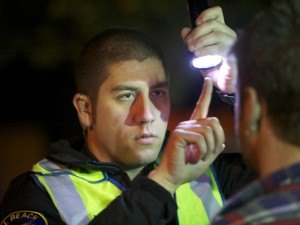California DUI Tests
 California DUI Tests
California DUI Tests
For California DUI cases, police officers first have to have probable cause, or a warrant, for the detention and investigation of a DUI, and for the California DUI tests used for evidence – the DUI breath testing or DUI blood testing used to establish your alcohol (or drug, for DUID cases) levels.
California DUI Tests – Field Sobriety Tests
The first potential type of testing in a DUI case is the field sobriety test. Our Orange County DUI lawyer wants you to know that under California law, all field sobriety tests (FSTS), are voluntary. They can be refused without consequence, and we recommend that you refuse these tests if asked.
There are only three standardized field sobriety tests, known as the SFSTs. Those three are validated by studies done over several decades, funded by the National Highway Traffic Safety Information, and conducted by Marcelline Burns and others at the Southern California Research Institute, towards the goal of correlating tests to impairment or showing subjects were above a .08% blood alcohol level.
According to NHTSA, the SFST is a “battery of three tests administered and evaluated in a standardized manner to obtain validated indicators of impairment and establish probable cause for arrest.” The three tests that comprise the Standardized FSTs battery and that are currently used are the following:
- The Horizontal Gaze Nystagmus. This test requires eyeball tracking of a stimulus, to see if there is “fluttering” of the eyeball over several slow passes horizontally, and a vertical testing as well.
- The Walk and Turn Test. This test requires that the subject listen to, and follow, specific instructions to perform a heel to toe walk along a real or imaginary line, nine steps up, nine steps back, and with a turn in the middle.
- One Leg Stand. This test requires that the subject also listen to and follow instructions, and then, with hands at their side, lift one leg and count aloud for a count of thirty while balancing.
Other tests include the Rhomberg Balance Test, the Finger-to-Nose Test, and the Finger Tap Test.
It is not uncommon for even sober people to have difficulty with these three tests. The police are trained with specific instructions that if they are not given correctly, they are invalid as a test for the presence of alcohol in the system. And police often do not do every part of the test perfectly.
Some things that can cause the field sobriety tests to be excluded from use in the case may be all, or any, of the following:
- You are tired. Being tired can affect your balance, can affect your vision and coordination, and being sleep deprived can directly mimic the effects of alcohol in your system. It can also make your eyes look like you have been drinking, even when you haven’t. It’s as dangerous as driving with alcohol in your system.
- You are nervous. Being nervous is completely understandable when you are stopped by police and tested. Jurors often are very sympathetic to your performance on the FSTs after seeing how the test results are explainable through nervousness.
- You are overweight. Being overweight, according to the NHTSA manual used for training, is a factor that affects the field sobriety test results.
- You are old. It states in the manual that the tests “are not designed to be used with the elderly or anyone over 65 years of age.”
- You have ankle problems, knee problems, or hip problems. Those types of problems will directly affect balance and will make it more difficult to perform at all on the types of testing that the field sobriety tests are made to reveal results for.
- Your test was not given under proper conditions. Roadside tests are often given in extreme cold, or heat, with traffic, and are rarely a “straight, even surface”, as the NHTSA manual requires. That is very common and can invalidate the test.
- The officer already decided you were under the influence before the tests began. One powerful factor affecting a person’s performance on field sobriety tests is the officer’s interpretation of that person’s performance. Police officers have often already decided that a person is intoxicated even before the person performs the field sobriety test. As a result, the officers are going to see what they expect (or want) to see.
California DUI Tests – Chemical Alcohol or Drug Tests
Under California Law, only breath or blood tests are given for DUI investigation. Changes to the law in 2010 made urine no longer an option for DUI testing, unless there is a suspicion that a drug that might show up in a urine test, but not a blood test, is present (usually for Driving Under the Influence of a Drug (DUID) cases), or in situations where a blood or breath test is not available, but a urine test is.
- Blood Testing: A blood test must meet certain requirements, including being taken within three hours, being drawn from a licensed phlebotomist, not being subject to contamination, including bacteria in the vial, or an alcohol swab of the skin at the time of the blood draw, among other factors. We have on our site a list of all the defenses to a blood test.
- Breath Testing: A breath test must also be taken within three hours, and be free of mouth alcohol contamination, have a sufficient sample, and be tested with a device that is properly calibrated and maintained. We have on our site a list of all the defenses to a breath test.
Contact Our Firm.
Contact our firm if you have a question about any California DUI tests, at our law firm anytime. You can contact us at (949) 682-5316, or use the contact the firm form.


